CIA Sponsored Terror, Civil Liberties, Criminalizing Dissent, Crony Capitalism, Habeas Corpus, Human Rights, Iraq War, Military Tribunal, Political Prisoner, Prison Industry, Targeting Muslims, Truth to Power, War Resister
Podcast: Play in new window | Download
Updates:
- FBI: If You Give Us Assata Shakur, We’ll Free The Cuban Five
- Michael Ratner: Massive CIW March St. Petersburg, Florida 2015
- Alliance For Fair Food
—-
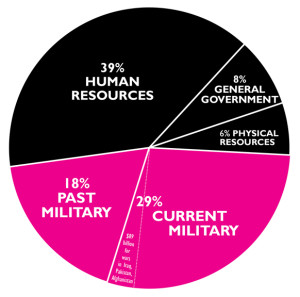
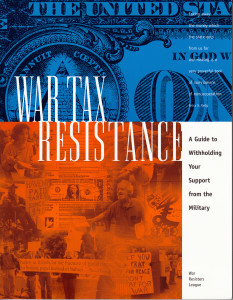
War Tax Resistance
As April 15 draws near, some Americans engage in the practice of war tax resistance, refusing to pay some or all of their federal income tax. It’s an act of civil disobedience with a proud history in this country. Notable war tax resisters included Henry David Thoreau who refused to pay his poll tax during the Mexican-American war. In the 1960s and 70s, many Vietnam war protesters engaged in the practice, including Norman Mailer, Howard Zinn, James Baldwin and Joan Baez. While individuals refusing to pay war taxes cite the refusal as a moral imperative-even citing international law to bolster this assertion—it’s not surprising that the Internal Revenue Service considers the refusal to pay such taxes as illegal.
Ruth Benn:
- In war tax resistance we tend to use the War Resisters League chart where your income tax money really goes and the calculations from the War Resisters League over the years have been around 50 percent.
- About 27 percent is current military so that’s paying for the wars and its buying the weapons for the next wars and all of those things that the Pentagon does.
- The “past military” is mainly for the debt and then the money that’s set aside for veterans.
- The nuclear weapons program which they are increasing over the coming 10 years, modernizing weapons and modernizing delivery systems. Obama is increasing that money for the nuclear weapons. That’s in the Department of Energy.
- We have the Department of Homeland Security. That is a lot of armed people also. The TSA, the militarization of the border. Homeland Security is giving those grants to local communities in the U.S. that are getting these military weapons.
- We have 500 billion this year for veterans and past military. That’s only going to add up.
- Basically, (war tax resistance) is similar to conscientious objection in terms of people who refuse to go into the military or refused the draft. So this is a refusal to have my tax dollars drafted. A refusal to pay income taxes that go into this pie of the military budget.
- There was a particular tax put on people in WW2. A stamp that people had to buy that was on their cars that supported war.
- (Famous tax resisters) We tend to go back to Henry David Thoreau of course with his one dollar that resulted in on the duty of civil disobedience.
- I always say going throughout history taxes first tend to be put on people because somebody wants to fight somebody. A government wants to go to war, that’s centuries back.
- The Vietnam War of course was the biggest time for tax resistance when it really was a strong part of the peace movement.
- The campaign during Vietnam to resist the telephone tax. A tax that was put on and raised during Vietnam. It was put on to 10 percent just to pay for the wars.
- People would owe 7.00 dollars in phone tax and some of them had their houses seized, some had their bicycles and cars seized.
- Within the network of war tax resisters and I hesitate to call it a movement these days, there are people who do a whole range of things. There are people who live on a very low income which is a legal way to do it. The cut off for filing and owing taxes is around 10 thousand dollars for a single person.
- There are people who are more adept at using credits and deductions to lower their taxable income.
- I think in ’87 I started very consistently filing and refusing to pay. You get a lot of letters. I have files and files of collection letters, of course they add up interest and penalties.
- Now I’m self-employed, the IRS can do things like garnish salaries. Over the years I figured out how to live in a way that makes it harder for them to collect. Not that they couldn’t make my life difficult.
- Mostly the IRS would like to get the money than prosecute people.
- I got active in the peace movement with the American Friends Service Committee. I’m not a Quaker myself but war tax resistance tends to known pretty well in the Quaker community.
- Usually you’ve been active (in peace movement) for a while and then you go . . oh, I’m paying for this. I’m paying for what I’m fighting against.
- nwtrcc.org
- War Tax Resisters Guide – The Book.
Guest – Ruth Benn, Coordinator of the National War Tax Resistance Coordinating Committee. Along with Ed Hedemann, she co-edited the fourth and fifth editions of the book “War Tax Resistance: A Guide to Withholding Your Support from the Military, published by the War Resisters League.”
—–

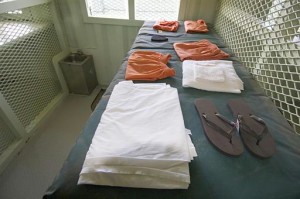
Life After Guantanamo: A Father And Son’s Story
In the weeks after September 11, 2001, the United States gave bundles of cash to Afghan war lords and the Pakistan government to assist in capturing suspected Taliban and Al-Qaeda fighters. Hundreds of men were turned over to U.S. custody often without evidence. This was an unfortunate starting point of how human lives were destroyed to as some suggest, justify an illegal war launched by the Bush Administration. Center for Constitutional Rights, senior staff attorney Pardiss Kebriaei’s Harper’s Magazine article titled Life After Guantanamo: A Father and Son’s Story traces the human toll of how her clients were wrongly imprisoned. After being picked up in Pakistan, sent back to Afghanistan, detained in Kandahar, Abdul Nasser Khantumani and his son Muhammed were interrogated by the United States and sent to Guantanamo Bay Prison in Cuba.
Attorney Pardiss Kebriaei:
- I started in 2007 and it took me year to be able to go down to the base. I went to down in mid 2008, that was the first time I met Muhammad.
- Muhammed was the son, he was a teenager and he was taken into U.S. custody. By the time I met him, he had been at Guantanamo for 6 years. 6 years without charge.
- What I say in the piece is he started breaking down, really kind of cracking in 2005.
- He was saying things like – I don’t care if I’m here another 5 years, another 10 years, I’m never getting out.
- He’d been held in solitary confinement for 2 years at that point, and there was this additional aspect of the way his relationship with his father was used to traumatize him.
- They were captured together, transferred to Guantanamo together but then, pretty much held apart in prison.
- In November of 2008 we met then in December he cut his wrists.
- He doesn’t call it suicide because he didn’t want to die. He just didn’t know what to do.
- We filed an emergency motion with the court, asking the court to move him out of solitary to get him close to his father, to do something.
- The latest hunger strike in 2013, they denied it was happening.
- Muhammed was young and he was really vocal and loud about his torture. I remember hearing him yell and scream.
- Abdul Nasser, his pain was quieter. There was a different kind of pain that left a wife behind or children behind. Abdul Nassar thought a lot about the rest of his family.
- We know that the CIA was paying millions of the dollars to the Pakistani government and Afghani war lords to profile and turn people over, basically sell them into U.S. custody.
- They came into U.S. hands because they profiled and unilaterally deemed by President Bush and Rumsfeld to be enemy combatants without any real evidence of wrongdoing.
- We know that happened and its not just groups like CCR saying that.
- The way that decisions are made and people are transferred (from Guantanamo Bay Prison) is such a lottery.
- I think Abdul Nassar appeared to be more of a burden frankly to them, because he was older and in ill health. They didn’t take him. They wanted a younger guy who they thought would be easier to resettle.
- Part of the point of the story was to shed light on just what life is like after Guantanamo.
- Abdul Nassar has not seen his wife since 2001. He hasn’t seen his other children since 2001. He hasn’t seen Muhammed since that day in 2009.
- http://ccrjustice.org/reunificationafterguantanamo
Guest – Pardiss Kebriaei, Senior staff attorney with the Center for Constitutional Rights, which she joined in 2007. Her work focuses on challenging government abuses post-9/11, including in the areas of “targeted killing“ and unjust detentions at Guantanamo and in the federal system. She is lead counsel for CCR in Al-Aulaqi v. Panetta, which seeks accountability for the killing of three American citizens in U.S. drone strikes in Yemen, and was counsel in Al-Aulaqi v. Obama, which challenged the authorization for the targeting of an American citizen placed on government “kill lists.” She represents men currently and formerly detained at Guantanamo in their efforts for release and reintegration, and represented the families of two men who died at the base in their lawsuit for accountability, Al-Zahrani v. Rumsfeld. She also represents Fahad Hashmi, who pled to material support for terrorism after years in pre-trial solitary confinement and Special Administrative Measures, in his efforts to challenge his continuing solitary confinement in a federal “supermax” prison.
——————————————————

Is Law and Disorder important to you? Consider a tax deductible donation to the show. By making a donation, you’ll be helping Law and Disorder continue to provide the consistent high quality content on some of the most pressing legal, human rights and international issues. This radio show is now a sponsored project of Fractured Atlas, a non-profit arts service organization. Contributions for the charitable purposes of Law and Disorder must be made payable to Fractured Atlas only and are tax-deductible to the extent permitted by law.
CIA Sponsored Terror, Civil Liberties, Criminalizing Dissent, Habeas Corpus, Human Rights, Iraq Veterans, Iraq War, Military Tribunal, Political Prisoner, Targeting Muslims, Torture, War Resister
Podcast: Play in new window | Download
Updates:
—–

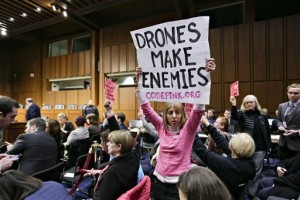
ISIS and The Anti-War Movement
Last June, the United States sent more military soldiers to Iraq and carried out airstrikes to stop the advance of the Islamic State of Iraq and the Levant known as ISIS. The US, Western Europe, Saudi Arabia and Arab Gulf policy is to overthrow Syrian President Bashar al-Assad which is also the goal of ISIS and other jihadis in Syria. ISIS’s membership may be close to 15 thousand members, half of what the CIA estimates. ISIS is led by a core of people who fought the U.S. in Iraq, fought the Iraq Army back in 2003 and then in 2011 fought in Syria. Last week our own Michael Ratner reported how the U.S. could be given leave to make war everywhere if President Obama’s request for AUMF is granted by a US Congress. What are the demands of the US peace movement?
Attorney Jim Lafferty:
- It was U.S. military strategy in the Middle East to begin with and past U.S. military action in that part of the world, especially in Iraq that provided the primary catalyst for the growth of ISIS.
- We destroyed the secular governments in Iraq and Libya that created the political space for ISIS and other right wing forces to grow.
- ISIS filled the governing vacuum took advantage of these ethnic divisions angered at the U.S. and steadily gained strength thereafter.
- If you think about it, we spent the last 40 or 50 years destroying leftist and secular, anti-imperialist movements all over that region of the world.
- Two weeks ago the Pentagon announced their sending 4000 troops with very heavy weaponry to Kuwait.
- The U.S. Army has already set up a division headquarters in Iraq. A division consists of 20 thousand troops.
- The people that are having the most success in fighting a Syrian government right now is ISIS.
- The question is not should they be stopped. The question is what will be effective in stopping them.
- There is great unity in the anti-war movement. They’ve got unified actions planned for later this month in Washington DC.
- The anti-war movement is going to be tough for the anti-war movement because the propaganda machine, the mainstream media in this country has done its job in pandering by showing despicable pictures.
- What we don’t see is Saudi Arabia our staunchest ally, executes 20-25 people by beheading every month.
- Cindy Sheehan, is setting up a Camp Casey at the Capitol. All the anti-war groups are holding a mass teach in on this very issue we’re talking about now.
- First of all a nuclear power like Israel getting all exorcised about the fact that somewhere down the road a neighboring country might have the same weapons it has.
- Pardon me if I can’t get terribly excited about that. We shouldn’t have any country in the world with nuclear weapons.
- In addition to everything else (Netanyahu) is lying about the threat if it were a threat. To come to the U.S. Congress to give that bloviating speech where he offers nothing new.
- He offers no alternative to what the administration is trying to do and is apparently making some progress in doing and is hailed as a hero by one side of the aisle is really quite appalling.
- Answer.org
Guest- Attorney Jim Lafferty, Executive director of the National Lawyers Guild in Los Angeles and host of The Lawyers Guild Show on Pacifica’s KPFK 90. 7 FM.
—-
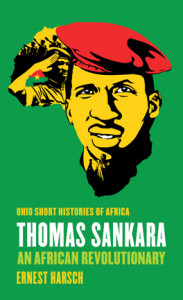
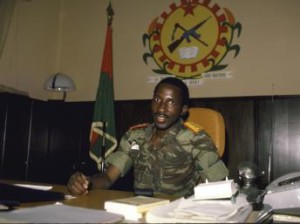
Thomas Sankara: An African Revolutionary
As president of the Burkino Faso, one of Africa’s poorest countries, Thomas Sankara was often called the African Che Guevara. In 1987, he was assassinated during a military coup that took down his government. However, Sankara’s economic and social policies left an important mark not only on his country but across Africa. Sankara was a Marxist and openly sought independence from France and at the same time he was building a pan-African unity.
Professor Ernest Harsch:
- He was the president of Burkino Faso from 1983 to 1987, a very short period of time.
- He was a revolutionary. Everybody acknowledged that at the time especially the French who greatly disliked him.
- The U.S. wasn’t too happy with him. He wanted to stop in Atlanta to meet with Andrew Young during his visit to the UN General Assembly. They didn’t allow him to make that stop. So he spoke in Harlem instead.
- It’s a small west African country, not even that many experts on Africa know that much about it. He was in power for about 4 years and he was overthrown by a military coup.
- I think for people that are interested in progressive change its always useful in seeing how others elsewhere in the world are fighting against oppression, are fighting for their rights and occasionally actually able to make some change.
- It’s also useful to learn about what kind of leadership can help people do that.
- He wasn’t a grassroots activist. He came out of the military. He was a captain. He got radicalized in the military and because of the context of his country which was extremely poor and under-developed, backward and subservient to the French who been their formal colonial power, very corrupt both military and civilian politicians over the decades.
- He’s representing a newer generation where that initial idealism about independence will bring all sorts of changes. He’s speaking to the ills of formally independent countries that are still subservient to their colonial masters and still haven’t found a way to break out of the trap of underdevelopment and external economic domination.
- He’s speaking to a new generation that still resonates today which is young people who are fed up with the way things are.
- They’re fed up with the corruption of their leaders whether they’re elected or not elected.
- You travel through west Africa you see Sankara t-shirts.
- The first time I met him was in New York. The guy was direct. He listened to what you had to say. He thought about it. I’ve never met anybody who was so quick. I mean he was witty.
- The other times I met him in Burkina. The first time was a long interview. The other times he didn’t want to be interviewed, he just wanted to talk about politics.
- Up to that time, nobody hand promoted or named so many women to cabinet position. One of them now is the current minister of justice.
- They tried to tackle some restrictions on women at the local level. It’s hard they made a small dent in it. They fought against female genital mutilation, the right to divorce by mutual consent.
- It (the country) was called Upper Volta which was a colonial name. They wanted something African and Burkina Faso, the words are from two local African languages basically means the land of the upright, or the uncorruptible people. The people are known as Burkinabe and Burkinabe comes from a third African language.
- Before he became president he was briefly a prime minister in a coalition government. His first trip was to Libya.
- Then he went to the non-alliance summit in New Delhi and gave this very fiery speech basically solidarizing with the Cuban revolution, with the Nicaraguans, with the Western Saharans, with the new Calidonians. He clearly aligned himself with the anti-imperialist, pro-third world, pro-development wing, within the non-alliance movement.
- The French didn’t like that. So, they told some their people locally, look let’s get rid of this guy.
- They had an internal coup. He was arrested. He was in prison for a while but they couldn’t sustain that. He was too popular. He became president.
- He was only 33 when he became president, so this was a youthful leadership.
Guest – Professor Ernest Harsch has taught courses on African development and political instability in the Sahel and is a research scholar affiliated with the University’s Institute of African Studies. He earned his PhD in Sociology from the New School for Social Research in New York. Throughout a professional career as a journalist, he wrote mainly on international events, with reporting on Asia, the Caribbean, and Eastern Europe, but most extensively on Africa.
—————————————————–

Please help support Law and Disorder by clicking on Fractured Atlas graphic. This radio show is now a sponsored project of Fractured Atlas, a non-profit arts service organization. Contributions for the charitable purposes of Law and Disorder must be made payable to Fractured Atlas only and are tax-deductible to the extent permitted by law. You can donate as little as 5.00 a month.
CIA Sponsored Terror, Civil Liberties, Criminalizing Dissent, Crony Capitalism, Gaza, Habeas Corpus, Human Rights, Political Prisoner, War Resister
Podcast: Play in new window | Download
Updates:
- Michael Ratner: Jury Awards $218.5 Million in Terrorism Case Against Palestinian Groups
—-


The Campaign For A Commercial Free Childhood
The National Football League, Mattel’s Girl Scout Barbie Doll, and even McDonald’s all have something in common. They’ve engaged in highly sophisticated corporate marketing aimed at enticing young children into becoming life-long consumers and brand loyalists. They’re the subjects of the efforts of The Campaign For A Commercial Free Childhood to cease clever marketing that sends the message that purchasing will make children happy. The campaign has a proven track record of educating families and the public about how industry partnerships with schools, nonprofits and trusted institutions such as the Girl Scouts expose young people to inappropriate content with potentially negative consequences.
Josh Golin:
- Very unfortunately, the Girl Scouts which has been traditionally a wonderful organization providing role models for girls launched a partnership last year with Barbie.
- This partnership includes a website where girls can play a Barbie game about choosing careers but really all they’re doing is looking at different Barbie outfits and seeing other Barbie dolls that they can buy in the store.
- There’s even a Barbie patch that Girl Scouts can earn.
- We thought that this was such a harmful campaign to young girls that the Girls Scouts have traditionally been a refuge from the commercialism that is aimed at kids everywhere and clearly Barbie represents a problematic body type and focus on appearance and fashion and is in some ways the antithesis of what the Girl Scouts have traditionally represented.
- They get 2 million dollars from Mattel from this partnership.
- The message to young girls that you have to look like a fashion doll when you’re going out on a hike is unbelievable.
- On the envelope that the report card came in was ad from McDonald’s saying bring your report card to McDonald’s if you had good grades or had good attendance or even good behavior and you get a free happy meal.
- We do a lot of work on the area of advertising in schools. It’s really an unfortunate trend. There’s been an increase in it since 2008 when we had the economic downturn and schools are understandably looking for revenue any way they can get it.
- There has been this increase in marketing to kids in schools and we think that’s particularly harmful to children. Anything advertised in the school comes with the school’s endorsement.
- One of the things that’s most concerning about what the NFL does is they market Fantasy Football extensively to kids. They even have a curriculum in school to teach kids about Fantasy Football where they could then go online to the kid NFL website and compete for cash prizes.
Guest – Josh Golin, is Associate Director of CCFC and organizes CCFC’s advocacy campaigns and develops its communications strategy. His writings about the commercialization of childhood have appeared in a wide range of publications.
——
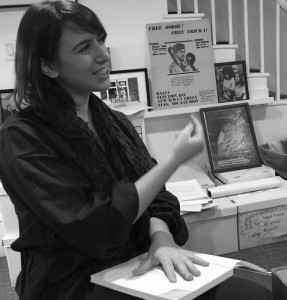
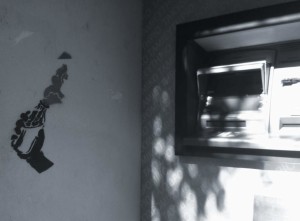
Greece Debt Crisis Postponed, Creditors Back Reform Plans
Earlier this year, we reported on the historic election voting in the Greek anti-austerity party of Syriza, led by Alexis Tsipiras. Syriza’s platform is to take back power within the Greek government, to effectuate a program that will call for cancellation of debt, nationalization of the banks, and expropriating closed factories. Greece is a member of the Eurozone, the nations that have joined with a common currency in 1999. Now, after barely a month in office, the Syriza Party led by Prime Minister Alexis Tsipiras has been forced to make compromises on major issues such as labor reforms and agreeing not to undo privatization plans, to name a few. The crisis began when the European Central Bank said it would reject Greek sovereign bonds as collateral which made Greek banks dependent on Emergency Liquidity Assistance. Last week, Syriza entered negotiations with the EU and ECB and secured a four month extension of its financial rescue.
Nantina Vgontzas:
- Let’s start with December 2009 when the Greek government declared in had sovereign debt of 109 percent, which is something they’ve been covering up the past few years.
- Goldman Sachs was also involved with helping them to cover up those figures.
- We should look at the political economy of the Eurozone constructed in the early 2000s. At the same time in Germany you had wage depression, meaning Germans were getting lower wages so that German exports would become more competitive and the European periphery was used as a dumping post. So they were getting more lending from German banks and that’s how you started getting more debts in Greece.
- The European Union, The European Central Bank and the International Monetary Fund which has played its hand since the 70s in imposing discipline on the countries throughout the developing world and Greece was the first so called advanced country that was starting to enter into this regimen of so called structural reforms that were attached to these bailouts that Greece was recieving to deal with the debt issue.
- Attached to these structural reforms was the termination of collective bargaining agreements, the reduction of minimum wage . . . so you have massive social degradation and at the same time the debt continues to rise.
- So the debt went from 109 percent of the GDP to 175 percent of the GDP.
- So Greece is basically getting loans so it can pay interest on interest starting in the early 2020s and Syriza rightfully identified this as an extended pretend strategy.
- They were the opposition government between 2012 and the end of 2014 and in 2015 they got 35 percent of the vote which wasn’t enough to form a government on its own which is why it had to form a coalition government.
- Everybody knows that Greece can’t pay off its debt til the early 2020s.
- I’ve written a piece in the Jacobin saying that I don’t think Eurozone would take any chances on letting Greece leave the Eurozone because of how helpful it has been to German capital. They’re not willing to take the long term risk, they’re not will to take the short term risk of speculative attacks that would occur on the Eurozone.
- A Greek exit could have produced a domino effect, perhaps Portugal would have left, Italy, you start having big economies like Spain leaving. That kind of domino effect would be unsustainable for the Eurozone to exist.
- There are ways of dealing with this (Greece leaving the Eurozone) You would have to impose capital controls, you would have to nationalize the banks, which is something that the Syriza leadership said that they wouldn’t do prior to elections. They’re going to have to revisit that strategy. Then you would have to figure out how you would ration food, fuel, pharmaceuticals in order to deal with immediate problems. Then you would have to talk about long term policies that would promote growth.
- They (Syriza) cannot move to a technocratic approach because then they would lose thier fundamental element as a left party.
- Half of the police corp (in Greece) support the Golden Dawn. This is something that Syriza has to neutralize while they’re in power.
- They need to be neutralized by promoting a strategy that’s actually going to reverse austerity.
- Jacobin Magazine -Nantina Vgontzas /Financial Times – Wolfgang Munchou
Guest – Nantina Vgontzas, a Greek-American PhD student in sociology at NYU focusing on political economy and social movements. She is a member of the UAW Graduate Student Organizing Committee and is involved in the Academic Workers for a Democratic Union reform movement.
——————————————————–
CIA Sponsored Terror, Civil Liberties, Criminalizing Dissent, FBI Intrusion, Guantanamo, Habeas Corpus, Human Rights, Political Prisoner, Prison Industry, Supreme Court, Surveillance, Targeting Muslims
Coming Up Next Week Police Shooting Reaches Supreme Court Exclusive Michael Avery Interview
Podcast: Play in new window | Download
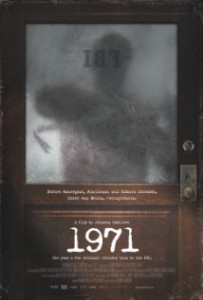
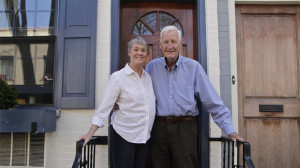
1971
On March 8th 1971, a group of anonymous individuals calling themselves the Citizen’s Commission to Investigate the FBI, broke into an FBI field office in Media, Pennsylvania. They stole thousands of government documents. Among the documents was proof that the FBI under J. Edgar Hoover, was spying on law abiding citizens. The program is known as COINTELPRO and it was used to monitor, manipulate and disrupt social and political movements in the United States. The Citizens’ Commission to Investigate the FBI has been documented recently in a highly acclaimed film titled 1971, directed by Johanna Hamilton.
Johanna Hamilton:
- I consider myself to have the good fortune to have known Betty Medsger, the author of the Burglary, for many years.
- She and I had a personal relationship that long predated our professional collaboration.
- Over time she came to share the outlines of the story with me and it sounded completely remarkable.
- She introduced me to a few members of the Citizens Commission to Investigate the FBI. The 40th anniversary was approaching.
- They wanted the story, which was so little known, to have a larger life.
- To be clear, Betty worked many years on the book. She’s done remarkable and profound research and I joined much later and was the net beneficiary of so much of her research.
- There were four years where we worked in tandem.
- When I showed the film to the Citizens Commission, while the credits rolled, Keith (Keith Forsyth – the lock picker) especially, he got up and said, good job.
- It’s a period of history I’ve been fascinated with since I was a teenager. It was the story of these extraordinary ordinary individuals who had put everything on the line and taken such great personal risk to benefit democracy.
- They trained themselves for one night of crime. They steal all the documents in the office, leak them to the press. They send them to major newspapers, and to a couple politicians. In the end, the Washington Post is the only newspaper that decides to publish the first stories.
- Those first stories reveal with out question illegal government spying on citizens who are going about their daily lives and exercising their First Amendment rights.
- Betty wrote the first stories in the Washington Post and the story fades a little from the headlines. The Pentagon Papers explode 3 or 4 months later. Daniel Ellsberg is on the scene.
- Then our story picks up again.
- It seems inconceivable now but Hoover had been director for over 50 years, and that’s no longer possible.
- Some people who seen the film before say they were really moved by the Church Committee hearings.
- Attorney David Kairys is a huge figure in Philadelphia and yes back in the day he was contacted by two members of the Citizens Commission. He didn’t know what they had done, but if they got caught, they could call him day or night.
- We were reaching the tail end, or we thought we were reaching the tail end of the film when the Snowden revelations happened.
- The Snowden revelations were one thing, absolute bombshell, but prior to that we had a couple of other instances. Back in 2011, September, there were raids all across the country, animal rights activists, environmental groups. One night Brian Williams introduced the news and described these raids and said you know its reminiscent of Hoover back in the 1970s.
- We had whole scenes cut together with that footage and debated and deliberated on that. In the end erred on the side of excluding it.
- It’s opening here in New York City and will start rolling out across the country. If you check our website we update the cities that it will show at. It will be on PBS, Independent Lens at the end of May. 1971Film.com
Guest – Johanna Hamilton, director of the film 1971. She also co-produced Pray the Devil Back to Hell, which won Best Documentary at the Tribeca Film Festival in 2008 and was shortlisted for an Academy Award. Johanna has produced nonfiction programs for PBS, The History Channel, National Geographic, A&E, Discovery Channel, and The Washington Post/Newsweek Productions, including September’s Children, a documentary for PBS exploring how children around the world are affected by terrorism and war.
—–
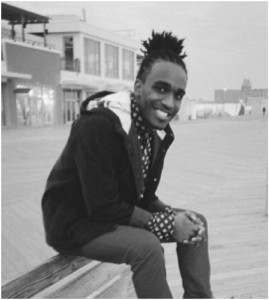
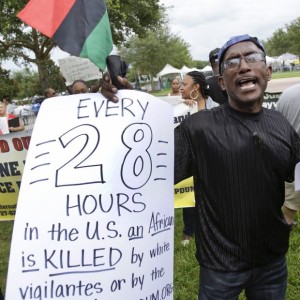
Inspiring, and Awakening Political Activism in Youth
Young people across the nation have played a critical role in taking to the streets to protest social inequities, from Ferguson, Missouri to New York City. In a recent article in the journal Socialism and Democracy, “The Roots of Mass Incarceration: Locking Up Black Dissidents and Punishing the Poor,” writer, activist and youth pastor Nyle Fort describes how he became politically active and who inspired him. We talk with Nyle about the status of protest in this country, the forces of oppression, how young people are involved and how he helps inspire them.
Nyle Fort:
- I graduated from Morehouse College and ended up going to seminary. I was already a licensed and ordained preacher but I wasn’t politicized yet.
- I had already been involved in the community via the church doing speaking engagements with youth and things like that.
- It wasn’t until I got into Princeton Theological Seminary that I began to get politicized.
- The way that it happened was I was taking an introductory seminary class called Systematic Theology with a professor Mark Taylor. In that class he actually had Mumia Abu-Jamal call in live from death row.
- When I heard him speak, I stopped in my seat. This man who I knew nothing of was speaking to me that was moving, not only me but I could tell the entire classroom and doing so by a 6 foot, by 10 foot cell. A cell that he had been in for 30 years, longer than I had been alive.
- Two weeks later I found myself through Mark Taylor at my first rally December 9, 2011. Two days after Mumia had been released from death row.
- I read the New Jim Crow very quickly, then Angela Davis’ works. That was really the beginning for me.
- I entered activism through a prison abolitionist lens, through Mumia.
- The rally for me was an embodiment of the things Mumia was talking about.
- I preach. I was at First Baptist Church in Lincoln Gardens. It’s one of the largest black churches in New Jersey. My style of ministry was evolving as I was being radicalized and politicized.
- I tried to do a lot of social justice work. We were writing letters to our incarcerated brothers and sisters as forms of religious activism.
- I discovered a prophetic religious tradition that comes from a black liberation theological perspective.
- When I was on the bus ride back from Ferguson I was really mad. Mad as hell because I felt there was a relative silence from the church, particularly the black church.
- I believe in love not as a word but as a work.
- When I engage with youth, I try to practice a love that is material. I tell young people, I love you more than they hate you.
- We have to deal the trauma and the pain that we inherit as black people living in the western world and all around the world.
- Love for me is a critical, not a politic that we can talk about, but a practice we can embody and engage in everyday. That has material life.
- We’re going to take Cornell West’s worlds seriously that justice is what love looks like in public, then we have to have a love that’s expansive enough to be material and to be felt.
- Black Lives Matter particularly as a network has articulated a feminist politic, a black feminist politic, a queer politic that is forcing us to live out our intersectionality.
- What we’re not talking about enough is that’s messy, and its not romantic.
- I think of oppression as institutionalized lovelessness. Let’s love each other in ways that causes each other to act.
- Twitter – @nylefort
Guest – Nyle Fort – Nyle is a Master’s of Divinity candidate at Princeton Theological Seminary, a youth pastor, freelance writer, and grassroots community organizer based in Newark, New Jersey. He was very active during the protests in Ferguson, Missouri and New York City.
—————————————————————-

Please help support Law and Disorder by clicking on Fractured Atlas graphic. This radio show is now a sponsored project of Fractured Atlas, a non-profit arts service organization. Contributions for the charitable purposes of Law and Disorder must be made payable to Fractured Atlas only and are tax-deductible to the extent permitted by law. You can donate as little as 5.00 a month.
CIA Sponsored Terror, Civil Liberties, Criminalizing Dissent, Crony Capitalism, Habeas Corpus, Human Rights, Political Prisoner, Prison Industry, Supreme Court, Surveillance, Torture
Podcast: Play in new window | Download

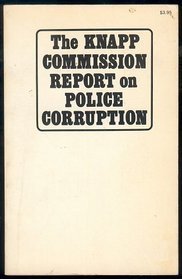
Blood On Their Hands: The Racist History of Police Unions
The NYPD police officer union’s outrageous assertion that New York Mayor Bill de Blasio had “blood on his hands” in the murder of two NYPD officers, is consistent with the reactionary role of police unions across the country. They came to prominence in the wake of the civil rights movement. Police unions have played a powerful role in resisting all manner police reforms and in defending police officers no matter how outrageous and racist their actions. Attorney Flint Taylor brought an analysis of police unions playing a major role in defending cops throughout the last few decades in his article Blood On Their Hands: The Racist History of Police Unions.
Attorney G. Flint Taylor:
- I started to look at this because I had been in battle with the union here in Chicago, the Fraternal Order of Police, since I’ve been a lawyer which is almost 45 years.
- After I saw what was happening in New York, I did some research on New York as well as brought back to memory a lot that had happened here in Chicago.
- In New York I took it all the way back to Mayor Lindsey when he attempted to deal with and bring about a civilian review agency of the police department.
- One of the instances (in New York) police showed their displeasure by running through the black community banging on the tops of garbage cans, waving their guns around and Abe Beame had to get a restraining order to stop them.
- The racism of it all became more apparent under Mayor Dinkins reign in the 90s, when he again revisted the idea of strengthening the civilian review agency.
- Sometimes you find that the union is to the right of the police hierarchy.
- When I put together the article and studied New York over the last 50 years and brought together my understanding here in Chicago, is that they’re so fundamentally racist. They don’t even represent all of the cops.
- They represent the white power structure, the most reactionary aspects of the department.
- Whenever racism is at the heart of police actions, you’ll find the union shoulder to shoulder defending those actions by those cops.
- In Chicago it started around the Democratic National Convention in 1968. The murder of Fred Hampton and Mark Clarke, the Black Panther leaders.
- Of course the FOP became extremely actively involved in defending the indefensible in the Jon Burge police torture cases and has been at the heart of it here in Chicago for 20-30 years in resisting all forms of justice in the Burge torture cases.
- Right after he (Burge) was fired by the police department in the mid-nineties, the union had the temerity to organize a float to honor Burge and the two other officers who were found to have tortured . . . in the St. Patrick’s Day parade.
- The union here again is a white officers union – not only that – the white officers union, it represents the racist interests of a certain click of police officers that patrol the communities of color here in Chicago.
- Until there’s a fundamental change in policing and the justice system, the union is going to have that kind of power and is going to continue to flank on the right, what already a reactionary, military force which is the police department.
- It’s basically universal maybe more so in the big urban areas.
- We have to educate our brothers and sisters in the broader labor unions like the SEIU and the unions that support the correctional officers.
- Police unions reflect police departments, police departments are occupying forces. They were created to put down the working class. They were created to protect the interest of what is now the one percent.
- So, how could they be part of the movement that deals with workers’ rights and fights against racism when that’s what they’re defending?
Guest – G. Flint Taylor, a graduate of Brown University and Northwestern Law School, is a founding partner of the People’s Law Office in Chicago, an office which has been dedicated to litigating civil rights, police violence, government misconduct, and death penalty cases for more than 45 years.
—–
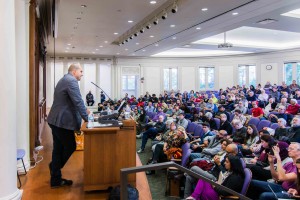
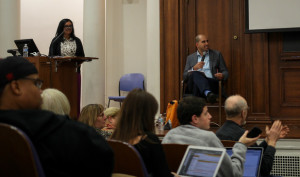
Inter-Nationalism: Encountering Palestine In American Studies
Professor Steven Salaita at age 39 had already written 6 outstanding books. He was a tenured professor at Virginia Tech University. He was offered a job with tenure at the University of Illinois in their American Indian Studies program. He accepted the job, and quit his other job, left his house, his wife did the same, left her job. They were enroute to Illinois for him to start working when he was told by Chancellor Phyllis Wise that he was not going to be hired. He was fired from a tenured job he had been offered at the University of Illinois because of his tweets criticizing Israel’s murderous war on the people of Gaza last summer .
Why? The university was under tremendous pressure as documentary evidence shows by private donors who said, you hire Salaita, we won’t give you money. The university caved. Salaita didn’t get his job. He’s now out of work and he’s about to file or will have filed a lawsuit trying to get his job back and reassert the principles of academic freedom, academic shared government and free speech. We hear a presentation by Steven Salaita titled Inter-Nationalism: Encountering Palestine In American Studies delivered at New York University November 2014.
——————————————————————-

Please help support Law and Disorder by clicking on Fractured Atlas graphic. This radio show is now a sponsored project of Fractured Atlas, a non-profit arts service organization. Contributions for the charitable purposes of Law and Disorder must be made payable to Fractured Atlas only and are tax-deductible to the extent permitted by law. You can donate as little as 5.00 a month.
CIA Sponsored Terror, Civil Liberties, Climate Change, Criminalizing Dissent, Habeas Corpus, Human Rights, NSA Spying, Prison Industry, RFID, Surveillance, Targeting Muslims, Torture, War Resister
Podcast: Play in new window | Download
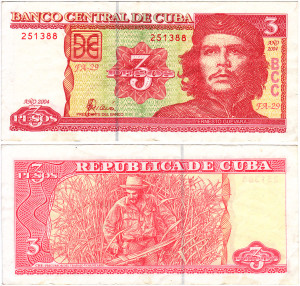
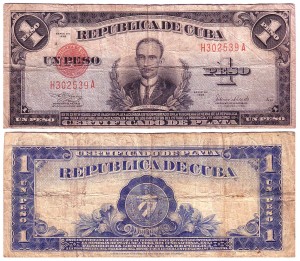
U.S. Cuban Foreign Policy Changes Strategy: Normalizing Relations
Last year, in a sudden reversal of policy, the United States released the remaining three of the Cuban Five who were imprisoned for arrested in the United States while investigating Cuban exile groups accused of terrorism. The release was part of a prisoner exchange announced on when President Barack Obama ordered the restoration of diplomatic relations with Cuba, that has been isolated by a trade embargo for 54 years.
Sandra Levinson:
- When you’ve lived through 10 or 11 presidents and you’ve seen how bad our policy can be, and also the disappointment that people like me felt, since Obama had been elected, that almost nothing had been done for improving travel for Cuban Americans.
- The point at which I cried was when he said he was going to open an embassy in Havana, because once you got over the fact, the 3 political prisoners were coming home, that was sheer joy to realize along with the Cubans, they were crying too. They said we’ve finally been recognized as a government.
- I think it will be great for the Cuban artists.
- By the second day the people were saying we have to make sure we keep our culture.
- We have to be sure we keep our country.
- Cuba needs help with its infrastructure, it doesn’t need McDonald’s
- We still have the Helms-Burton law. We still have the embargo. I think our next fight is to get rid of the Helms-Burton law because that has done so much to strengthen the embargo.
- I think the Cubans will attempt to slow the flow of people from the United States to what they can manage.
- As we all know the infrastructure for tourism is not sufficient to take care of everyone. I’m surprised they didn’t recognize sooner.
- Clearly its because of US interest that we are doing this. We are not doing this to finally be nice to the Cuban revolution.
- cubaupdate.org / cubanartspace.net
Guest – Sandra Levinson, President and Executive Director of the Center for Cuban Studies. She was one of the Center’s founders in 1972. In 1991 Levinson spearheaded a lawsuit against the U.S. Treasury Department which resulted in legalizing the importation of original Cuban art. She is currently directing works at the Cuban Art Space, which she founded in 1999, to properly house and archive the thousands of posters, photographs and artworks which the Center has collected in the past 42 years
——
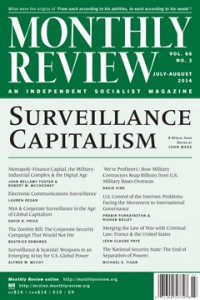
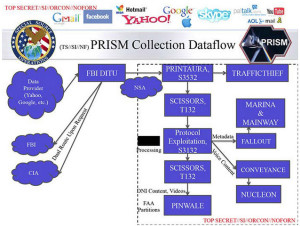
Electronic Communications Surveillance
In the recent Monthly Review, there’s an article titled Electronics Communications Surveillance written by attorney Lauren Regan. The article enumerates the various laws, acts and court cases that have led up to collecting information on millions of citizens such as phone, internet, and email habits, credit card and bank records. Nearly all of our on line activity is subject to being surveilled by the state. Lauren breaks it down from Electronic Communications Privacy Act of 1986, an extension of the 1968 Federal Wiretap Act, the FISA Act and on to the USA Patriot Act in 2001. The article is grouped into 3 areas, wiretaps and “electronic eavesdropping,” stored messages, and pen registers and trap-and-trace devices.
Attorney Lauren Regan:
- The corporations that are engaged in gray intelligence use the term threat assessment.
- They look at activist communities even individuals and determine what level of threat they pose to the profit making components of their enterprise.
- I think its important that activists engage in their own threat assessment as well.
- In the documents (FOIA requests) we learned that the corporations themselves want to maintain clean hands. They don’t want to get caught spying on Mom and Pop holding a banner on a street corner.
- They devised this scheme where there is this security firm and public relations firm that kind of open up their own shop next door.
- They’re often former FBI agents for some of these big corporations and industries. They will collect the intelligence and its up to these PR firms to put it into these “terrorist bulletins.”
- For a long time we knew that corporations often hired by the government itself but also hired by big industry has been going through open source intelligence. So they’ve been monitoring our websites and social media and email lists and press releases and any other public documents they can get their hands on in their 8 hour paid day.
- They compile all this information into reports and then they sell it to police or other corporations or the government.
- They call them issue monitoring or trend analysis. In essence it is attempting to both legitimize and make profit of spying on political groups and political activists.
- In my experience its less important to focus on the name of the corporation because they’re so slippery and constantly changing their names.
- The animal rights movement has definitely been a significant target for this type of spying.
- We were working with a number of different organizations who were afraid. Who were thinking of stopping their campaigns, because they were concerned they were going to be put in prison, that they were going to be labeled terrorists.
- One of the campaigns out of Pennsylvania, consisted of teachers, doctors, people who were once a week going out on street corners and holding a banner opposing fracking and they found themselves in a terrorist bulletin.
- Especially when you’re talking about giant coal industries, and tar sands industries. These are gazillion dollar corporations. They’re multinational in scope. They’re working together within their industries which means they have more money and resources to put road blocks in front of regular public interest citizens.
- There are things that you can do to make life more difficult for those that wish to spy upon you.
- Thor and VPN are ways to use the internet with less ability to be tracked or surveyed.
- We represent activists for free and we coordinate legal teams around the country to insure that activists have high quality representation, when they choose to risk their liberty for a cause.
Guest – Lauren Regan, the founder and executive director of the Civil Liberties Defense Center (CLDC), where she serves as our staff attorney as well. Ms. Regan operates a public interest law firm, The Justice Law Group, specializing in constitutional law, civil rights, and criminal defense. She is a founding board member and past president of the Cascadia Wildlands. She also serves as a Lane County Teen Court judge, Oregon State Bar Leadership Fellow, National Lawyers Guild, Eugene co-chair, and volunteers hundreds of hours a year to various progressive causes.
—–
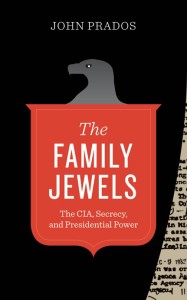
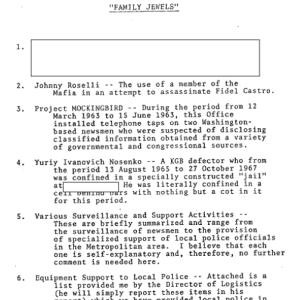
The Family Jewels: The CIA, Secrecy and Presidential Power
The surveillance and torture programs conducted by agents and contractors of the United States Central Intelligence Agency has a long sordid past. One of the first revelations of the CIA’s illegal activities released to the public was released in December 1974 by the New York Times. Details of surveillance, eavesdropping, detention and interrogation shocked readers. It was also became the foundation for deeper research by our next guest John Prados, a senior fellow of the National Security Archive in Washington, DC. He’s the author of the book The Family Jewels: The CIA, Secrecy and Presidential Power, where Prados recounts secret operations and how Vice President Richard Cheney played a leading role in intelligence abuses. He joins us today to talk about the Senate Select Committee on Intelligence Torture Report and the deeper connections based on his research.
John Prados:
- A semi-notorious document that was known as the family jewels – this was a record of CIA abuses of the 1950s, 60s, and 70s, when they were spying on American citizens. In fact the revelation was so explosive at that time it lead to multiple investigations of the CIA by the Church Committee, the Pike Committee.
- I think that the CIA has a preoccupation with image. The episode of the “family jewels” is typical because at the time the intelligence agency’s director was Michael Hayden. Hayden, simultaneous with the release of the document gave a speech taking credit for thinking of releasing the “family jewels” themselves.
- In my book The Family Jewels I have a couple of chapters that documents this kind of activity.
- We have been waiting 2 years for the appearance of this report.
- If you look at the website that’s maintained by former director Hayden, and former director Porter Goss and former director George Tenant, you will see that they posted on their website declassified CIA documents, much more lightly redacted that were released as long ago as last summer.
- These are the first documents I have seen containing direct Whitehouse action and activity on the torture issue.
- The best piece of this relates to early 2004, where there was the United Nations international day of support for victims of torture. Tenant sends a memo to Condi Rice and requests that the Whitehouse reconfirm Bush Administration support for the torture program.
- When that was not immediately forthcoming, they did this again.
- CIASavesLives.com
- These things were released as part of the argument that was made by former intelligence officials that torture was approved and legal.
- Not just damage control but the perpetrators, the agency officials responsible for this program,they know its not legal, they know its morally reprehensible. They’re operating under the fig leaf of this presidential authority and this mumbo jumbo Department of Justice legal memo network.
- If there’s a breath of questioning it all of a sudden, they’re not covered anymore. That’s the reason for the sensitivity and the reason why the CIA suddenly erupted in this effort to reconfirm these authorities.
- If you delete material from the documents in such a way that the public can’t tell that the material the CIA got was useful, or misleading everybody.
- The Senate report is so important because it shows on all of these cases, they took the ones twenty ones, the CIA most claims they got information for them. The report shows that in every one of those cases in fact they were getting information without resorting to the torture.
- I think we have a challenge. I think we need to work to make a wedge for accountability in this country. I do think Americans are shamed and embarrassed by this behavior. This is not what the United States is about.
Guest- John Prados is an author and analyst of national security based in Washington, DC. He is the author of more than twenty books and many articles on topics of current importance, presidential studies, international security; and diplomatic, intelligence, or military history. His current book is The Family Jewels: The CIA, Secrecy, and Presidential Power (University of Texas Press). Newly appearing in paperback are Islands of Destiny: The Solomons Campaign and the Eclipse of the Rising Sun. In addition Prados is author of titles on national security, the American presidency, and other subjects including Vietnam, the Soviet Union, and World War II. He is also a noted designer of boardgames on military strategy, intelligence, and diplomacy.
—————————————————————–

Please help support Law and Disorder by clicking on Fractured Atlas graphic (link is fixed). This radio show is now a sponsored project of Fractured Atlas, a non-profit arts service organization. Contributions for the charitable purposes of Law and Disorder must be made payable to Fractured Atlas only and are tax-deductible to the extent permitted by law. You can donate as little as 5.00 a month.

























